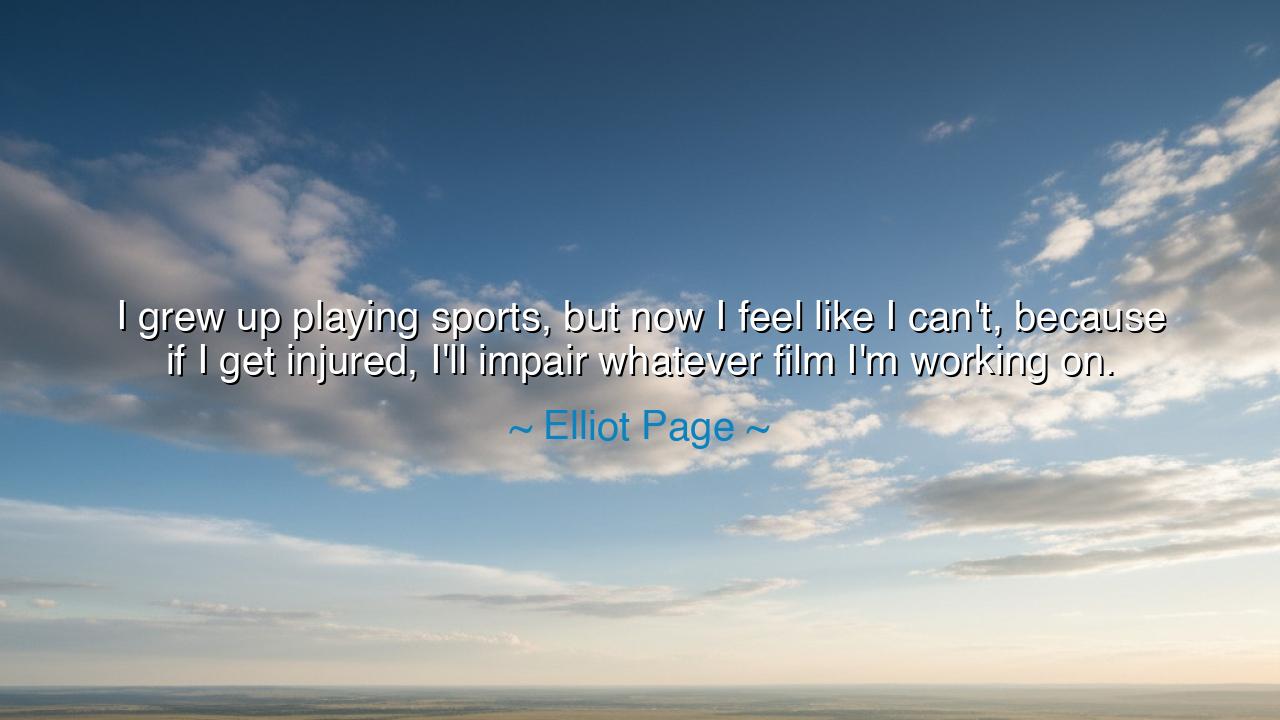
I grew up playing sports, but now I feel like I can't, because
I grew up playing sports, but now I feel like I can't, because if I get injured, I'll impair whatever film I'm working on.






Elliot Page, with the candor of one who has lived both in play and in art, once confessed: “I grew up playing sports, but now I feel like I can’t, because if I get injured, I’ll impair whatever film I’m working on.” This is not merely the complaint of an actor afraid of bruises, but the recognition of the weight of responsibility that comes with vocation. For when one is young, life allows for risk, for the unthinking joy of running, leaping, falling, and rising again. But when one bears the burden of craft, of career, of the expectations of many, even the simple pleasures of sports may be surrendered for the sake of duty.
The origin of this reflection lies in the eternal tension between freedom and responsibility. In childhood, games are pure freedom, an expression of life’s abundance. Injuries are small prices paid in the currency of joy. But in adulthood, when one’s body becomes the vessel of livelihood—whether on the stage, in the field, or in the workshop—injury is no longer trivial. It threatens not only the body but the work, the art, the promises made to others. Elliot’s words capture this shift, the transformation of play into caution, of freedom into vigilance.
History bears witness to many such sacrifices. Consider the gladiators of Rome: though their bodies were instruments of spectacle, they were also their only livelihood. An injury in practice meant ruin in the arena. Or think of the great dancer Mikhail Baryshnikov, who protected his body with almost sacred care, knowing that a torn muscle could silence his art. The very gift that made him radiant was also his prison, binding him to caution even as his spirit longed to leap. In Elliot’s reflection, we hear this same struggle: the longing for play held captive by the weight of craft.
Yet, this is not a lament without meaning—it is a testament to devotion. To say, “I will set aside my old joys to protect my greater calling,” is to show not weakness, but strength. The farmer does not trample his fields for sport, for he knows they bear the harvest. The blacksmith does not gamble with his hammer arm, for his forge depends upon it. Likewise, the actor, the athlete, the artist must often surrender pleasures to preserve their sacred duty. Sacrifice, though bitter, is often the companion of greatness.
But we must also hear in Elliot’s words the echo of longing: a recognition that the human spirit craves both duty and play. To deny one for the other leaves an emptiness. The ancients sought balance: even kings and warriors had festivals, feasts, and games to restore their spirits. The lesson here is not to abandon responsibility for reckless pleasure, nor to let responsibility strangle all joy, but to find ways to preserve the essence of play within the safety of one’s calling.
The lesson for us is clear: as life demands more of us, we must learn to balance joy with responsibility. Do not abandon what makes your heart alive, but adapt it to your season. If one cannot play rugby, one may still walk in the morning sun; if one cannot leap, one may still dance in gentler ways. Protect your calling, but do not starve your spirit. For joy, like strength, must be renewed.
Therefore, take Elliot’s wisdom into your own life: honor your responsibilities, guard the gifts entrusted to you, but also find new forms of play that nurture your spirit without endangering your path. Life is not only about protecting the vessel, but also about filling it with joy. Every duty must be balanced with delight, every sacrifice with renewal.
And so, let this teaching endure: to grow is to sacrifice, but to live fully is to seek harmony between the fire of responsibility and the spark of play. Elliot’s words are not only his—they are ours, for all who walk the line between freedom and duty. The challenge is eternal, but so too is the wisdom to endure it.






AAdministratorAdministrator
Welcome, honored guests. Please leave a comment, we will respond soon